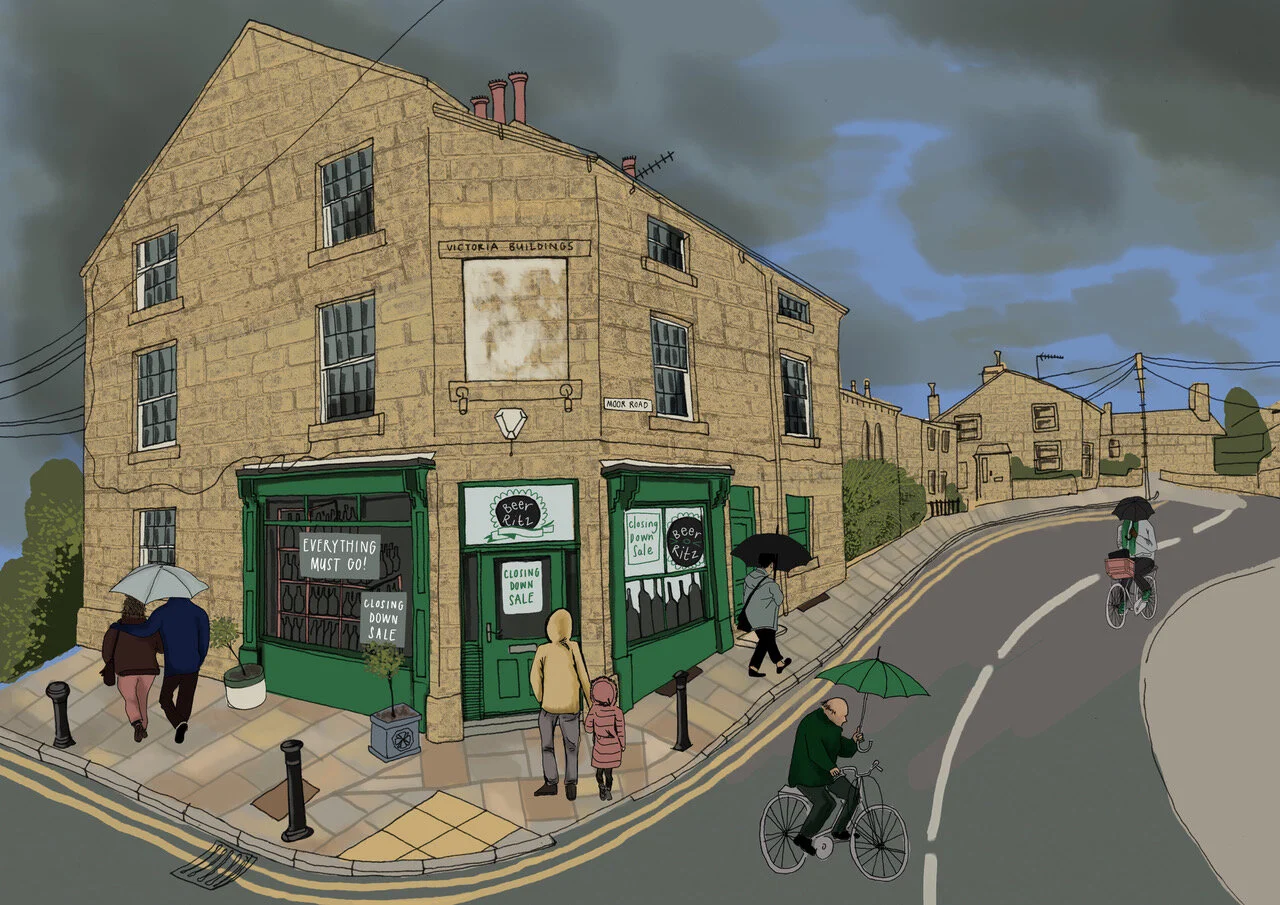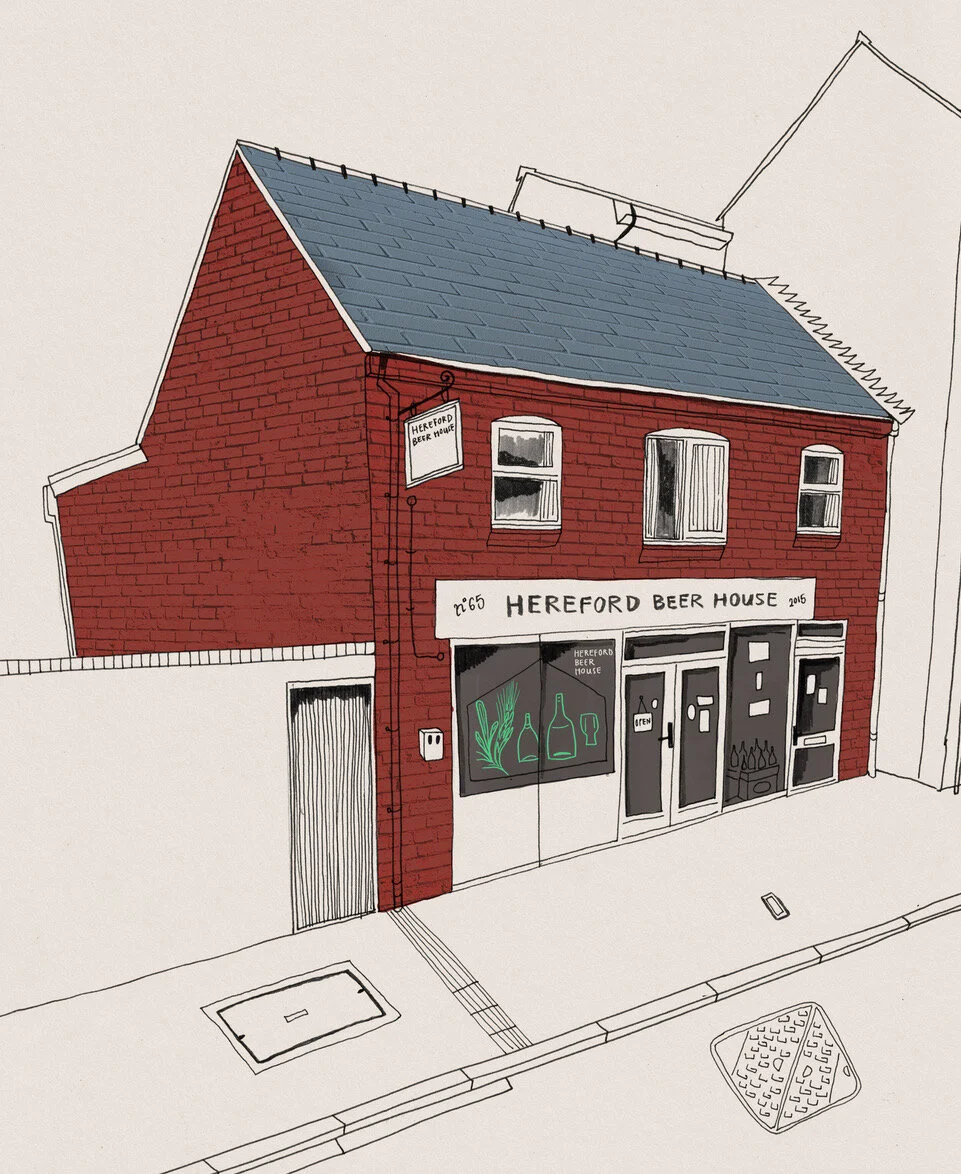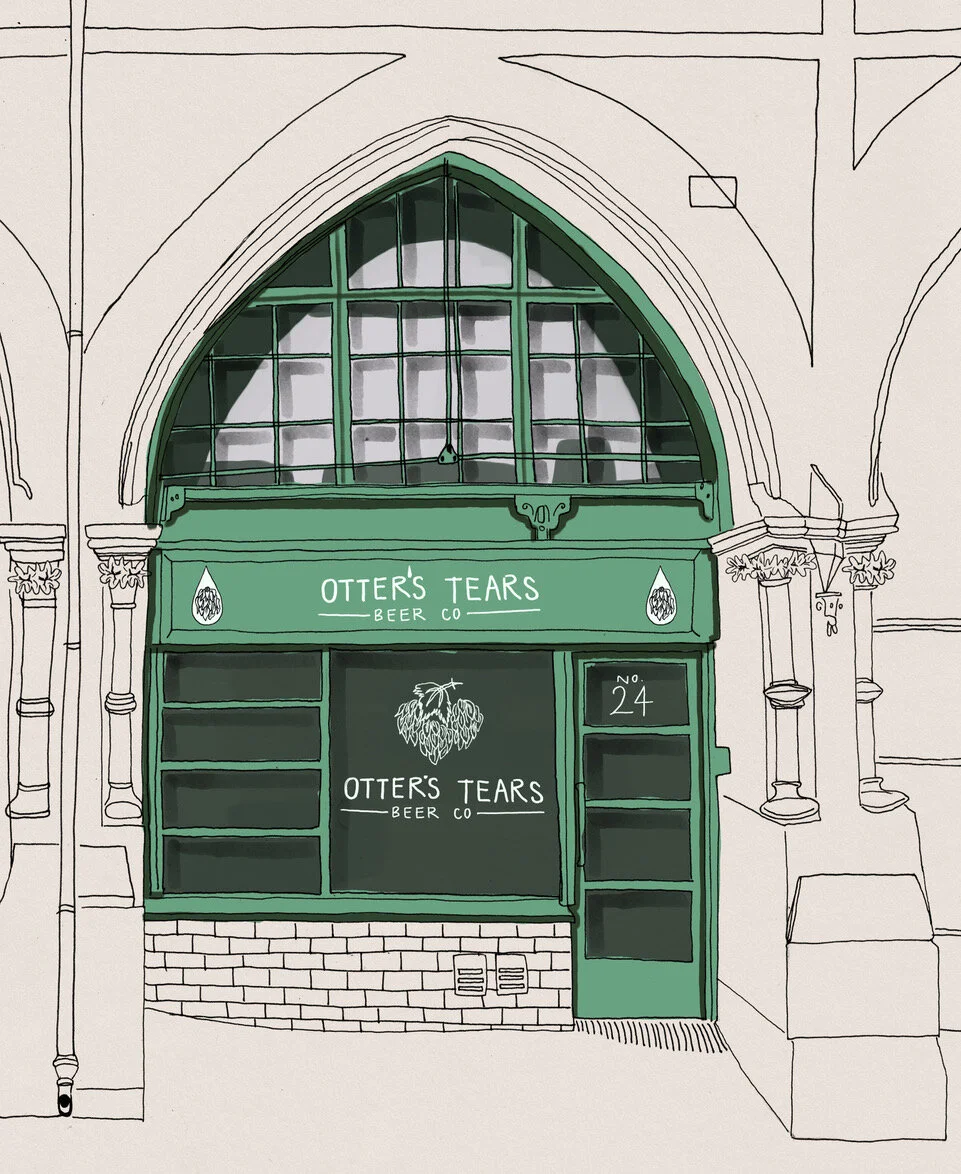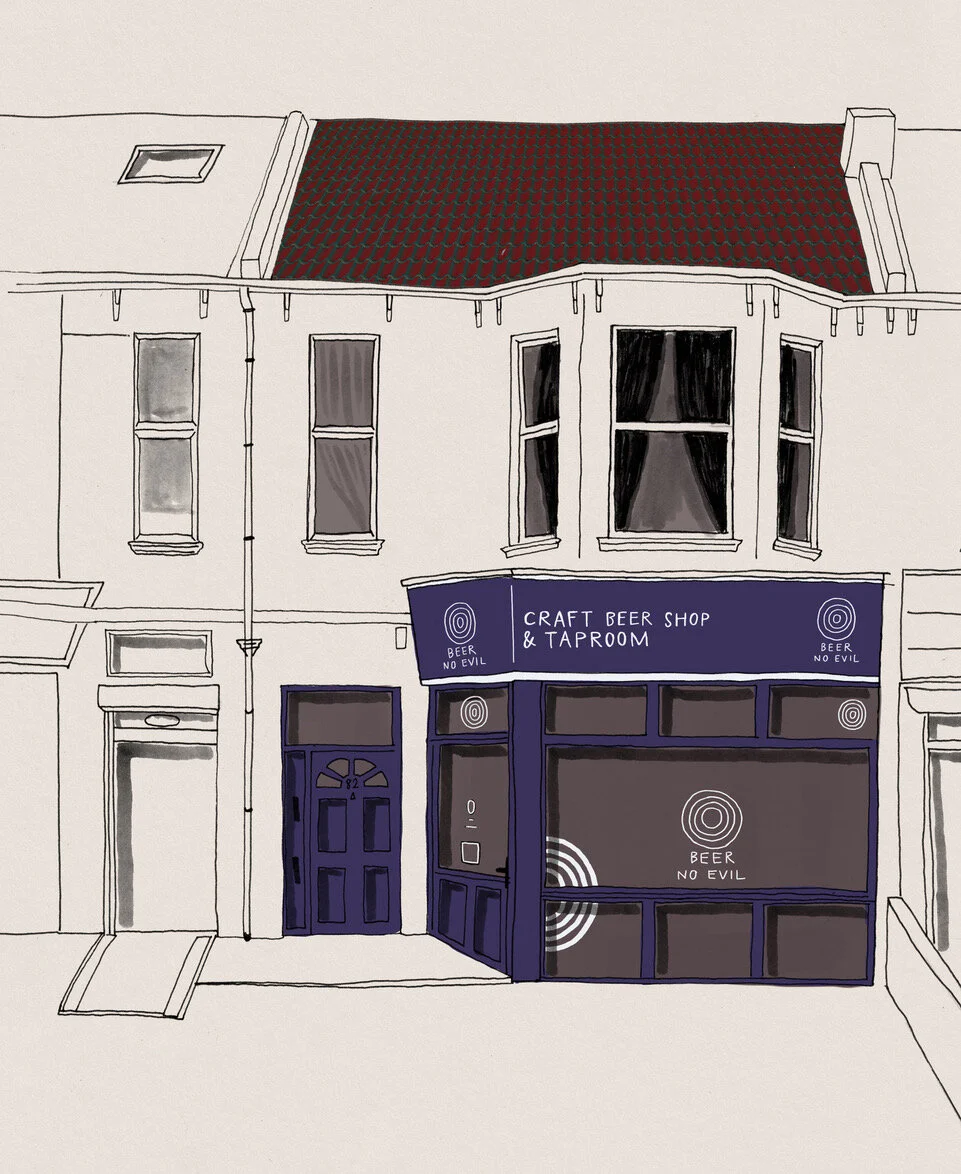Hop Fidelity — The Highs and Lows of the UK’s Independent Bottle Shops
When it comes to the vast and eclectic world of beer, the problem isn’t that there’s not a perfect beer for everyone. It’s that without a little help you might never find it.
At their best, bottle shops—the UK’s growing network of independent specialists beer sellers—stir and foster enthusiasm for great beer. And the people that run them get a kick out of helping others find something they’ll cherish. Few do it better than Zak Avery, the quiet yet charismatic owner of Beer Ritz in Leeds, West Yorkshire, one of the UK’s most celebrated beer retailers.
I’m not alone in tracing my journey in beer back to stepping through the small wooden doors of Beer Ritz. With its bright green shop-front standing out amongst the sandstone of neighbouring houses it looks more like a village shop than the foundation of the modern British beer scene it became.
This was why the news in July 2020 that its shop in Headingley was closing came as a gut punch. Even a well-loved shop such as this is not immune to the difficulties of making a living selling beer in the UK, with sales increasingly moving online, and supermarkets undercutting prices at every opportunity.
“Stack ‘em high, sell ‘em cheap” is being applied to craft beer. The void in pricing between supermarkets and bottle shops is forcing independents out of business, and long-term could even reduce the range of beers available to us drinkers.
““When craft really started appearing in supermarkets people were worried that they were going to start tapping into the beers that we’d all spent a decade promoting.””
“Three or four years ago when craft really started appearing in supermarkets people were worried that they were going to start tapping into the beers that we’d all spent a decade promoting,” Zak tells me. “It was just one of those unintended consequences of everybody’s passion of promoting really good, interesting, independently made beers [and] wanting everybody to share that passion and enthusiasm. I think what happened is that we succeeded.”
Being on good terms with your local beer shop can also get you first dibs on scarce or limited run beers, something Beer Ritz were infamous for, regularly landing beers that you couldn’t find elsewhere—whether it was the first pallet from The Kernel to make it out of London, or a case of Brooklyn Brewery’s Black Ops imperial stout, which went on sale in the early 2010s. The latter was one of Brewmaster Garrett Oliver’s lauded “Ghost Bottles,” beers he was still perfecting, or which he only used for private tastings or events, and not technically for commercial sale. Still, Beer Ritz got some, and we loved them for it.
“It was really funny because a lot of that was kind of pre-social media,” Zak says. “It spread very much by word of mouth. You had to try a little harder to be a beer geek back then.”.
Beer Ritz will now continue as an online-only shop, the bricks and mortar site in Headingley having closed for good. In doing so, it feels like a small but important part of the Leeds beer story has been lost. I’ve found myself wondering how many people who might have stumbled upon this Aladdin’s Cave of beer might not be afforded the same opportunity to easily get their hands on rare and interesting beers the way I was a decade ago.
***
Illustrations by Laurel Molly
Attracting local customers is sometimes at odds with selling the most flavoursome and challenging beers. Not long after Jonny Bright opened Hereford Beer House in late 2015, it became immediately clear that local tastes were a little more reserved than his own.
“We quickly realised that a lot of what we thought we were going to sell had to change because of our customers,” he says. “Because we were there at the beginning of people’s craft beer journey.”
Jonny and his partner Amelie converted Hereford Beer House from a previously empty retail outlet into a bright, modern beer venue. Pin-legged wooden tables fill the floor space giving an almost café-like feeling. With their experience drawn from years of visiting—and in Jonny’s case brewing at—breweries and taprooms around the world, Amelie and Jonny are totally at ease as they guide customers through the carefully curated selection of beers and ciders on offer.
““We quickly realised that a lot of what we thought we were going to sell had to change because of our customers.””
“From the outset, we did tutored tastings and events but after a while we stopped selling tickets, as actually people found that they could just as easily come in and talk to us,” Jonny says. “We’d happily spend five minutes talking them through some beers that we think they’d enjoy.”
Hereford also has a strong cider-making tradition and despite the name, Hereford Beer House has always been something of a must-visit for people looking to sample the very best small-batch ciders from local producers like Oliver’s, Ross on Wye, and Little Pomona. Part of the shop's fabric was grounding itself within the local environment and championing a world-class product that is little-known outside of the county, making the taproom and bottle shop a destination in its own right.
“It feels like cider is having a bit of a moment right now,” Jonny adds. “I think the turning point for a lot of people was natural wine and lambics, [as those people] have now started looking at ciders. Whether it’s the intrigue of the funk or from wood or from spontaneous fermentation, it’s all there in cider.”
***
Many among the new wave of specialist independent retailers in the UK are toeing-the-line between beer shop and taproom, with customers able to enjoy a few glasses of something special inside the shop as well as picking up beer to take away. But for some spaces even the ability to trade this way can’t keep the business afloat.
“Burslem has for the last two or three years been the town with the most empty shops” Phil Hardy, who runs Otters Tears in Burslem, Stoke-on-Trent, tells me. “Within about twelve months it became clear that we weren’t suited to be a bar. I’d never set out to be a bar, I always wanted to be a bottle shop, but I’d been led down that route by people saying ‘if you want to survive then you really need to do this.’”
Otters Tears first opened in 2015, bravely attempting to turn the fortunes of an already struggling high street. But, as with Beer Ritz in Leeds, in 2020 it was forced to close its doors, shifting sales entirely online. The turning point for Hardy was a particularly busy match day at local football club Port Vale. It left Phil pinned behind the counter at the rear of the store, with the seating area in the cellar largely ignored by the “vertical drinkers” standing in the shop’s entrance.
“I stopped doing drink-in from that point on,” Phil says. “We didn't lose any money by doing it, but it was far less stressful.”
““While it’s nice to be looked at as a place that people know they can go and get some really good quality beer, that doesn’t pay the overheads or keep the door open.”
”
Phil’s passion for beer began as a blogger on his website Beersay. He built Otters Tears’ reputation on the back of sourcing hard-to-find beers from some of what he saw as the best breweries, both in the UK and internationally. Even the shops’ name comes from the world of beer blogging, a nod to tongue-in-cheek Craft Beer Manifesto from often-missed fellow Simon Johnson who sadly passed away in 2013.
But “buying like a beer geek,” as Phil puts it, has left the shop struggling in recent years.
“People are picking and choosing more and more where to buy beer from—whether it’s online direct from the brewery, or from a supermarket—and you become the special visit,” he tells me. “Unfortunately while it’s nice to be looked at as a place that people know they can go and get some really good quality beer, that doesn’t pay the overheads or keep the door open.”
Rather than compromise on quality or compete with race-to-the-bottom pricing (“if your beer is on sale in the supermarkets we won’t be selling it,” Phil says) by moving online Otter’s Tears is doubling down on what it does best. Its focus will be on specialist beers, with a nod towards those that can be cellared for longer periods of time. He teases at some cases of Orval he’s squirrelled away, and imperial stouts that have been laid down to mature for a number of years.
“I’m working on the theory that I’ve got to be different,” Phil says. “What I’m interested in is the rarer, niche stuff, and a lot of Belgian stuff that just doesn’t see the light of day.”
***
Husband and wife Gareth Harries and Gemma Clegg had the idea to open Beer No Evil, their bottle shop and taproom in the small town of Worthing, West Sussex, as early as 2012—leaving behind life in South London and what they refer to as the “corporate treadmill.” They wanted to create a taproom and beer shop with the feeling of an independent record store; where customers return time and again to try something new, and feel comfortable asking for advice.
“In my twenties this would have been a record shop, in my mid-forties it’s a craft beer shop,”. Gareth, tells me. “But the thing is I remember going into record shops in the 90s, and they could be quite intimidating.”
Laughing away my comparisons to the exclusive, snobby record shop from the 1995 Nick Hornby novel (and subsequent film starring John Cusack) High Fidelity, Gareth and Gemma say they set out to create an environment which resonated with as wide a demographic as possible—from locals and tourists, to craft beer lovers, and newcomers alike.
“When one of our regulars first came in around 10 months ago she was adamant, telling us ‘I don’t like beer, I like cider and white wine.’ And of course, we told her that’s fine,” Gemma tells me. “We have a nice selection of ciders and some great wine. But because we’ve got [beer] taps we like to say: ‘well why don’t you just try this.’”
“Ten months later, and she has sampled her way through the shop. For me, it’s so nice to have experienced someone’s beer journey—and it’s only the start.”
““What we wanted to create with Beer No Evil was somewhere that wasn’t intimidating and you weren’t afraid to ask to try something.””
Their vision for the business they built together is clear in the way Gemma and Gareth talk more about how Beer No Evil should feel, rather than what it should sell. The store’s layout was as important to them as what they would put on its shelves.
As you walk under the black and white Beer No Evil logo with its distinctive concentric circles, you’re greeted by a large, central wooden table and likely the owners themselves. It’s a communal space and the friendly, casual hospitality feels as ingrained as the subtle watermark rings that dot across the grain of the table. Customers are grouped and dotted around the room in much the same way.
“What we wanted to create with Beer No Evil was somewhere that wasn’t intimidating and you weren’t afraid to ask to try something, or afraid to ask advice, or just to say: ‘I don’t know.’” Gareth tells me.
The real skill of bottle shop owners like Gareth and Gemma isn’t a superhuman palate or an encyclopaedic knowledge of beer, it’s empathy: the ability to know what people would enjoy and guide them towards it. An experience that we, as customers, can only enjoy face-to-face at independent bottle shops like theirs.


















